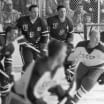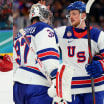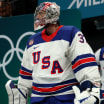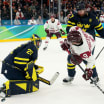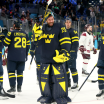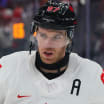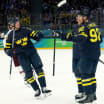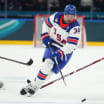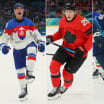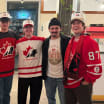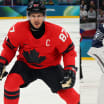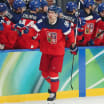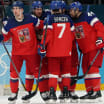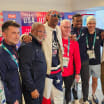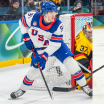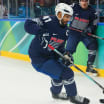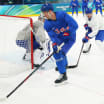Boyle discusses return with Penguins, Hockey Fights Cancer in Q&A
Forward diagnosed with chronic myeloid leukemia says it's 'privilege to play in this league'
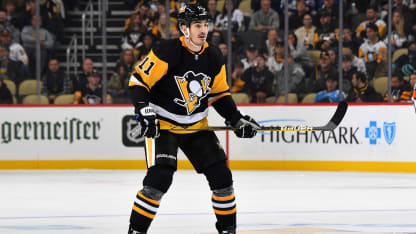
Not playing competitive hockey for nine months didn't stop Boyle from scoring three points (two goals, one assist) in 10 games as captain of the third-place United States at the 2021 IIHF World Championship. Not getting a call from an NHL team the next three months didn't persuade him to retire. The 36-year-old forward signed a professional tryout contact with the Pittsburgh Penguins on Sept. 3 and a one-year, $750,000 contract with them Oct. 12.
Hours later, Boyle scored in a season-opening 6-2 win against the Tampa Bay Lightning, his first NHL game in 14 months. He has scored two goals in 10 games for Pittsburgh, his eighth team in 16 NHL seasons.
"I have a belief in myself that with the help of family members and my trainer back home, I just kept that belief alive," Boyle said. "There's a mindset that goes in each day. There's a little bit of a stigma to a PTO, but if you can take that energy and use it to focus each day, especially after having not played last year, you just realize that it's such a privilege to … play in this league."
Every day, Boyle counts his blessings. He was diagnosed with chronic myeloid leukemia, a form of blood and bone marrow cancer treatable by medication, while with the New Jersey Devils on Sept. 19, 2017. He was in remission the following October, beating an 18-month timeline projected by doctors, and said his mentality was doing everything he could to show others fighting the disease that, "I'm going to be fine, don't worry about me, we've got this."
That strength extended to his 6-year-old son, Declan, who started playing youth hockey following an arteriovenous malformation of his jaw, a rare condition that impacts blood flow and oxygen circulation.
"He's doing great," Boyle said. "He's really fallen in love with the game, which I had hoped for obviously, but wasn't going to push him one way or the other. We still worry about it a little bit, but that's just the nature of the beast with what he had to go through for as long as he had to go through. We're going to have a little (posttraumatic stress disorder) from that probably forever. He's a trooper. He's a tough kid."
RELATED: [More Hockey Fights Cancer coverage]
Boyle was also guest of former New York Rangers teammate Dominic Moore at the Smashfest Charity Ping-Pong Challenge in Stamford, Connecticut on Aug. 1. Moore's first wife, Katie, died Jan. 7, 2013 at age 32 after a nine-month battle with a rare liver disease, one of a handful of types of cancer that often are underfunded with fewer treatment options. He founded Smashfest in 2012 to help fund research into rare cancers and concussions, and the 2021 event raised $130,000 with a large turnout despite the ongoing coronavirus pandemic.
Moore is the 2021-22 ambassador for Hockey Fights Cancer, an endeavor started in 1998 by the NHL and NHL Players' Association to unite hockey players to support the American Cancer Society and Canadian Cancer Society as national partners for the League-wide campaign that's raised nearly $30 million since its inception.
"He's used all the gifts that God has given him to make a positive impact in this world," Boyle said. "For what he's been able to do as the ambassador, I'm excited because he's such an A-plus human being and a determined man who has a great support staff and he's a joy to be around.
Boyle is living through the aftermath of his hardest fight, an experience he discussed in a Q&A with NHL.com.
What does Hockey Fights Cancer month mean to you?
"It really is a great initiative. When I got sick, and you see all the (I Fight For) signs in the crowd, I paid more attention to it. Everybody has been affected one way or another. That's the harsh reality of it. But then you look at all the signs and everybody has a couple names on there and I'm sure people could put more, unfortunately, for the people that are fighting. So the merchandise and the money that's raised, I think is such a huge thing because research development dollars have made it possible for me to take a much less invasive therapy, be able to play hockey and live my life with minimal side effects. The more research, the more development, the more awareness, the more understanding, it really is powerful what it can do."
The outpouring of support from NHL players, alumni, fans and those in your inner circle must have been overwhelming. How much of a boost did that give you and can give another cancer patient beyond what medicine can do?
"When you're inspired to do something or when you have a certain level of motivation or confidence, the product that you're going to perform is going to be better, no matter what you're doing. It's no different than playing in a hockey game. When you're feeling it, you're feeling it, and I certainly felt that throughout the League from players and staff members across the League, many of whom I had never spoken with. It is a small world, the hockey community, so I knew a lot of the names. But the amount of people that reached out was overwhelming and it was touching. You can believe, especially if someone's reading this that is going through that battle, there is a power there that, believe me, does make a huge difference."
You made it clear you were determined to return to the NHL. The Penguins gave you an opportunity and you're making the most of it. How has the game and the Penguins treated you since your return?
"The game's the game, man. There's no friends out there. Everybody's trying to win. The Penguins have been awesome. This is a great group of people. There's a certain comfort level in my understanding of what I need to do. Not to say it's comfortable because every day is a challenge. It really is. This league is getting better and better each year. We've had our own challenges because we've had some injuries and some COVID protocol, but there's something about going to work and going about our business for this organization that I think is a really good culture for success. The standards are very high, so the practices are intense. It's great to feel part of something like that again."
You beat that 18-month timeline and have said that setting goals are important things. Was it one day, one minute at a time?
"I think it was more like, you wake up the first few weeks, you feel a certain way. I had been before I was diagnosed little by little getting worse every day not knowing what was going on, so when I started the treatment, it was little by little. I started getting a little bit better. There were some side effects at first that worried me, but you just try to pay attention to your body because you can talk yourself into almost anything.
"Fortunately for me in the beginning, the treatments and the bloodwork were once a week and then once every couple of weeks. But each time it showed progress and my body was telling me you are getting better. Now it's more or less like brushing your teeth when you wake up and when you go to bed. I take my pills at the same time and try to live a healthy, normal lifestyle. It's not all that difficult when you're training and trying to perform at the highest level because you have to take care of your body. But everything has been really, really good. Even the testing that they've done now has been advanced too. They can look more detailed into the bloodwork and they can't find any of the bad cells, I guess, in layman's terms. I'm just fortunate again I'm able to take this treatment and be able to live the way I get to live."
What is your ultimate message about Hockey Fights Cancer?
"You see what cancer can do and the cruelty of the disease, and when people come together to try to fight it, strength in numbers is a huge thing. The initiative itself has done an unbelievable job of uniting people. I think they do a great job with Hockey Fights Cancer Night recognizing fans and young fans and bringing them on the ice and showing them at center ice what 18,000 people supporting you feels like. If we can continue this momentum of what the initiative has been able to accomplish over the last many years, continue to push, continue to raise money for research to try to eradicate this thing, that's the main goal. We continue to fight, and we do it by strength in numbers. And you can't ever give up. Like 'Jimmy V' (Jim Valvano) says, man, you can't give up."
